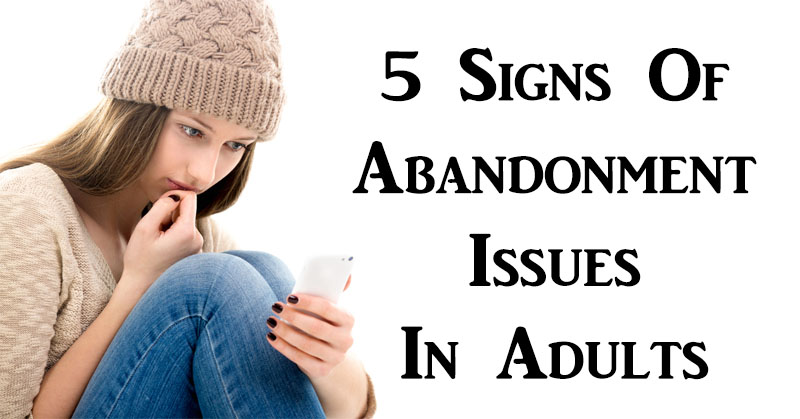Children are wired to become attached to their caretakers. Being able to depend on their parents is an important part of developing relationships throughout adulthood. Children who experience abandonment can develop post-traumatic stress disorder (PTSD). The long-term fear and a lack of a supportive social network may lead to abandonment issues as adults. (1)
Judging other people often comes too easily to us. We are so quick to point out another person’s flaws that we fail to recognize the struggles that person may be dealing with. Whether we’re with a friend, a family member or a romantic partner, being in a relationship with someone who suffers from abandonment issues can be tough. But being able to recognize their pain might allow you to help them find the right path to heal, while strengthening your bond.

Here are five signs a person has abandonment issues:
1. Chronic Insecurity
Adults who faced abandonment as a child often struggle with insecurity. Their feelings of not being worthy started at a young age and never really went away. As a child, they felt like they weren’t good enough to warrant love or affection from their caretakers. This feeling can bring about chronic insecurity and depression that they deal with on a daily basis. (2)
2. Isolation
As scary as it was to feel so alone as a child, adults with abandonment issues often replicate their isolation. They are so afraid to trust anyone or to let anyone in, that they choose to spend time alone. They might show little interest in romantic relationships or struggle to keep a social life. Isolation is a common sign of abandonment. (3)

3. Heightened Emotional Responses
Abandonment can cause heightened emotional responses to triggers. So what are those triggers? Well, anything that creates a separation, or pushes that person away, such as criticizing or excluding, dumping or firing from a job. Anything that makes a person flash back to their abandonment and brings up feelings of low self-esteem and depression can be a trigger. Someone who has been abandoned might overreact to such situations, have panic attacks or make impulsive decisions. (4)
4. Commitment Issues
Unfortunately, a person who has been abandoned before often has a hard time trusting other people. With any relationship, opening up to someone else leaves you vulnerable to separation. So those who suffer abandonment know that if they open themselves up to someone else, that person could leave at any time. This leads to a constant struggle with commitment, opening up to others, and showing vulnerability. (5)

5. Attaching To Someone Too Soon
Abandonment could cause isolation and lack of commitment, or it could cause a person to attach onto others too soon. Someone who was abandoned in the past might constantly long for another person to fill the void they feel. This form of dysfunctional connection, Anxious Attachment, explains why some people seem to have new BFFs often. You can imagine someone who feels abandoned wanting to latch on to other people – a new friend or a romantic partner – when they haven’t known them for long. (6)
So do you see yourself or someone you love as suffering from abandonment? Begin with small steps, and discover ways to release those attachments.
Sources:
The Refuge
Power of Positivity
Psychology Today
PsychCentral
Choosing Therapy


